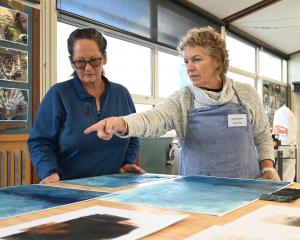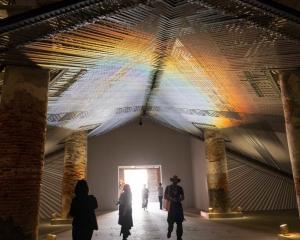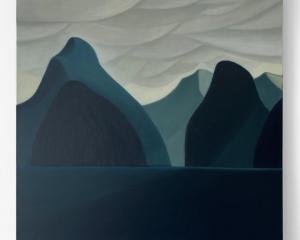When the Really Authentic Gilbert and Sullivan Performance Trust (RAGSPT) launched its audacious plan to stage all the famous duo's comic operas over 11 years in the most authentic versions and in the order in which they were written, many people thought they were crazy.
"We never knew we would actually get through but we hoped we would," says Michael Andrewes, one of the founding trustees and musical director for all the 13 productions.
Other founding members were Colin Gibson and John Drummond.
The trust began its 11-year odyssey in 2002 with the same show.
The Grand Duke is one of Gilbert and Sullivan's less well-known operas.
First staged in 1896, it ran for 123 performances, but was not revived by the D'Oyly Carte company, which had commissioned and staged all the pair's light operas, because of changing times, new forms of entertainment, and the death of Sullivan and Richard D'Oyly Carte.
It has only recently been revived professionally, according to Andrewes.
The trust thought its production of The Grand Duke would be a New Zealand premiere but recently discovered it had been staged in Wellington in 1900 by an amateur operatic society.
It is full of the usual Gilbertian humour, satire and silliness and Andrewes says Sullivan's music is fabulous. He even explores newer forms such as French cabaret in a roulette song sung with gusto by the Prince of Monte Carlo in a mixture of English and French.
The opera takes place in the German grand duchy of Pfennig-Halbpfennig where the theatrical company is plotting against the Grand Duke, who is weak and unpopular. The duke is expecting to marry Baroness Caroline von Krakenfeldt but it turns out he was betrothed at birth (a typical Gilbertian plot) to the daughter of the Prince of Monte Carlo who turns up with his now grown-up daughter and entourage.
"Even more madly, within the framework of the theatre company, the leading actress expects to play the main roles as specified by her contract, so when the leading actor contrives to become surrogate Grand Duke she expects to be playing the role of the Grand Duchess, but he's actually in love with another actress - it's even more crazily Gilbertian than ever!" Andrewes says.
Another joke that is slightly harder to recognise is that it's set in a German grand duchy, so by definition everyone on stage is German, but the troupe's leading lady, Julia Jellicoe, is a guest English actress. However, in the original production, Gilbert contrived to have a Hungarian actress play the role with a thick German accent while everyone else spoke without an accent, something the Dunedin cast has re-created here, Andrewes says.
Andrewes is always fascinated by the combination of "fantastically witty words written by a master of the English language who finds humour, and very quirky humour, in everything", and "the wonderful, approachable, tuneful music of Sullivan who was absolutely skilled in finding the music which enhanced and highlighted the language."
Bringing the works to life off the page and on the stage holds a particular fascination for him.
Gilbert worked with other composers and Sullivan with other librettists, but they were never better than when they were with each other.
They were like chalk and cheese in terms of personality but like two peas in a pod when it came to creating an integrated work with huge popular appeal, he says.
They appealed to a wide range of people - those who could see the harsh satire beneath the words, and those who just enjoyed the comic situations and accessible music they could go out whistling.
Andrewes also loves the quirky characters. Even though they may be stereotypes, such as the ugly elderly women, each has their own quirkiness and personalities - Ruth in the Pirates of Penzance is quite different from Katisha in The Mikado or the Baroness von Krakenfeldt in The Grand Duke, he says.
A long-time enthusiast of G&S, he says little of their work had been staged since the Dunedin Gilbert and Sullivan Society folded in the 1980s, although the opera company did a few of the more popular works. In the early 2000s, Andrewes, who had recently taken early retirement from the University of Otago, talked to a few friends who might be interested in reviving the operas in Dunedin.
"I can't quite remember who initiated the idea of doing the complete series as a special project, but that is what we decided on as a way of bringing G&S back to a new generation that hadn't experienced it before, but also in a way where we would respect the original text and use it absolutely.
"In reality, that meant trying to establish the first-night text because G&S very often cut and edited and deleted and lost bits and pieces. We thought we'd like to find the most original text and music setting and do them all, which has never been done anywhere in quite this way."
They also added other touches of authenticity such as, in the second year, doing two operas, HMS Pinafore and The Pirates of Penzance side by side to give some of the flavour of the D'Oyly Carte company, which staged several operas over a season of a month. D'Oyly Carte also toured extensively and the Dunedin company took The Gondoliers to the recently refurbished Oamaru Opera House in 2010. The cast regarded it as one of the highlights of the series.
More than 500 people have been involved with the RAGSPT productions during the past 11 years, 90% of them as unpaid volunteers.
Many of the participants have been loyal, being involved in several of the annual productions, and awards will be made to those who have taken part in six or more seasons, Andrewes says.
There have been about 250 singers on stage in the chorus or principal roles, including a handful of professionals, such as Joel Allen and Roger Wilson. Numerous designers, costumiers, makeup artists and hairdressers, set builders, props, stage hands, stage managers and other backstage people, lighting and sound engineers, and people who videoed and recorded the productions, have worked on the shows, as well as five directors - Geoff Smith, Don Evans, John Drummond, Hilary Norris and Alan Spencer, an English G&S expert. In the pit, 25-27 members of the Southern Sinfonia have accompanied each performance, and repetiteurs have played for rehearsals. Andrewes has been musical director for all the productions, which he says is a source of great personal satisfaction.
Funding the productions has always been a challenge, and because professionals, including the orchestra, have to be paid, budgets have averaged between $100,000 and $150,000 in recent years, depending on the complexity of the show and the director's vision.
"We had no illusions that we were going to fill our houses every show so it's a bit of a miracle we are still on the right side of the ledger, even if only just. This final show has to work to make sure we can pay our bills. I doubt if the city would bail us out like the rugby union," Andrewes says.
"The Otago Community Trust funded us generously every year. The city council gave us substantial funding for the last six years, and initially they gave us little bits of community funding, but they accepted this was a major thing for the city. On top of that, were all the charitable trusts and pokie trusts. We couldn't have done it without them, although there are ethical dilemmas in that. It's the way the system is and we've had to rely on them, but corporate sponsors have been very difficult to find."
The trust has built up assets, particularly costumes, some sets - although these are recycled where possible - librettos and scores, and the collection of recordings of the shows, which the trust will need to dispose of suitably before it winds up.
And having spent the past 12 years of his life committed to performance dates each year and finding people to do what needs doing, raising finance, researching the music, and directing the shows, Michael Andrewes is looking forward to getting a life - and finding other things he can do.
See it
• The Grand Duke, the final production in the Really Authentic Gilbert and Sullivan Performance Trust's project to stage all the operas in the order in which they were written, opens at the Mayfair Theatre on Sunday for a four-night season. On August 7 and 10, a curtainraiser, Trial by Jury, G&S's first opera, will precede the show.
• It is directed by Hilary Norris with Michael Andrewes as musical director and features Barry Dorking, Justin Freind, Joel Allen, Brian McKay, Erin Cameron, Jane Robertson, Nadya Shaw Bennett and many others.












